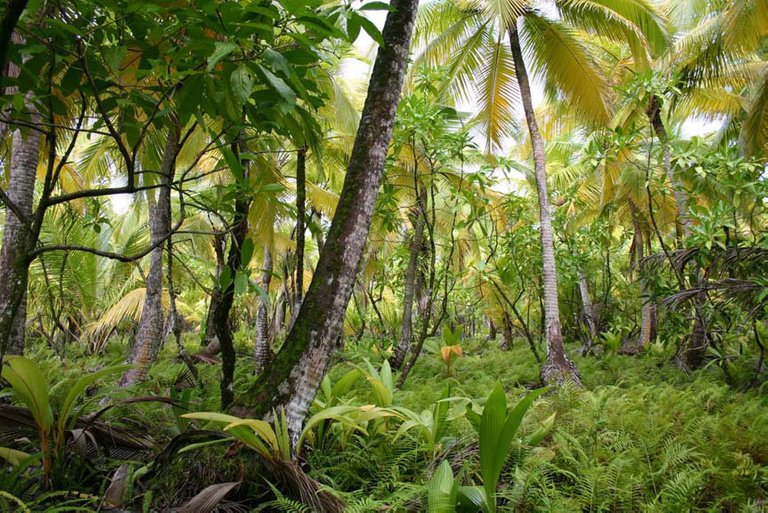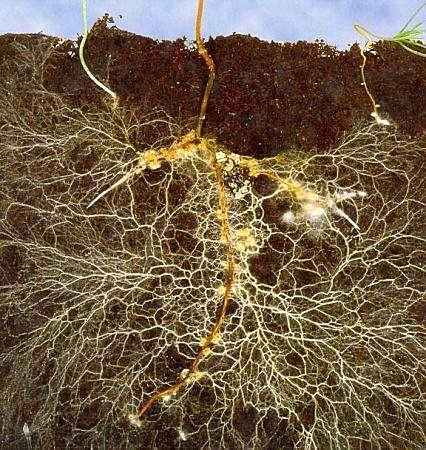Green Communication
It's something most of us don't think about very often, but plants are actually not passive at all and have a very busy life full of communication, partnerships and territorial behavior.

source: Wikimedia Commons
As much as we may believe plants' primary function is to please our senses and to feed us, I'm sure any plant would disagree if asked. And maybe we can ask them if we manage to decode their language; this post is about what we already (think we) know about their ways of communication. The plant language has for ages been undetectable, but modern biologists and chemists are beginning to understand the complex behavior of plants.
That behavior is for a great part based on the plant's main restriction: it can't ever leave its home. Because they don't have the option to get up and leave, plants are extremely in tune with their environment, and have almost 700 different kinds of sensors to stay up to date with the happenings in that environment. Underground the roots are actively seeking out concentrations of nutrition and water. But they also communicate through chemical signalling with fungi with whom they have a symbiotic partnership; when you pull a plant out of the ground, the fine white threads you see aren't part of the plant's root, but of an intricate web of fungi that help feed the plant by extending the root's reach significantly.

Mycorrhizal Fungi - source: Funguys Gourmet
This is a collaboration with active chemical communication between plant and fungus. When several of the same plants grow near each other, this web of the fungus enables the plants to communicate with each other and send each other signals and nutrients. But this is only the underground side of the story. Above ground the plant's social life is even more intricate, as it has to deal with insects and thousands of diseases. But a plant's first and foremost challenge is finding light.
It's a not commonly known fact that plants can not only sense the amount of light, allowing it to grow in its direction, but can also distinguish the light's color. If a branch or leaf is surrounded by mostly green light, that's a sign of heavy competition, spurring it on to reach further in the direction of yellow or white light. Plants also have some sense of touch as many of them literally grab on to supports to grow higher than they could have on their own, like vines
Inspiring The World About Soil and Plant Health: Mick Alexander at TEDxRockhampton
A lot of the plant-chemicals we enjoy daily, like caffeine and nicotine as well as many others, are produced by the plant to deal with its daily threats. Plants don't have nervous systems themselves, so why do they make chemicals that influence ours? Those are for the insects that attack them, or to lure in predator insects like bees or wasps, so they can kill that pesky caterpillar that's ravaging the plant's leafs. It's chemically communicating to the wasps and bees: "Hey, you! Come here, there's food here!".
Almost all of the chemicals a plant releases when threatened or attacked, also inform surrounding plants to prepare for an incoming attack by making the necessary defensive chemicals in advance. Now, with all this complex behavior, making decisions while reacting to and interacting with the environment and social structure, is it fair to say that plants have some sort of consciousness? Can we really speak of plants' "social lives"?
Plants (and plankton) perform one of the most important tasks for all other life on earth, which is photosynthesis. All cycles of life on earth begin here, as it is the energy from the sun that drives the entire planetary ecosystem and it is the plants and the plankton that convert the sun's energy into sugars by synthesizing water and carbon-dioxide. Even the energy we get from burning oil or coal is nothing more than the energy from the sun, stored in prehistoric plants. Watch the included inspiring videos, and please excuse the bad sound-quality of the below linked one. It's full of information about plants, the chemicals they produce and the ways they communicate with each other and other living things. Maybe we'll someday learn to talk to our green friends; I have a feeling they'll be able to teach us a lot!
Can Plants Talk to Each Other? Plant Communication by Chemical - Farming Smarter Conference 2016
The above is a slightly redacted version of a post I published in 2018 originally. I'm still suffering from an accident in which I broke two bones in my foot, and the pain got worse again today after my visit to the hospital where they cast the foot in plaster. I hope you'll bear with me through this unfortunate episode...
Thanks so much for visiting my blog and reading my posts dear reader, I appreciate that a lot :-) If you like my content, please consider leaving a comment, upvote or resteem. I'll be back here tomorrow and sincerely hope you'll join me. Until then, stay safe, stay healthy!

Recent articles you might be interested in:
| Latest article >>>>>>>>>>> | Thanos Was Wrong |
|---|---|
| Slap Coin? | REAL X-Files (repost) |
| Just Three Of Them | Plutocrat Talking (repost) |
| Personal Responsibility | Back To Work! |

Thanks for stopping by and reading. If you really liked this content, if you disagree (or if you do agree), please leave a comment. Of course, upvotes, follows, resteems are all greatly appreciated, but nothing brings me and you more growth than sharing our ideas.